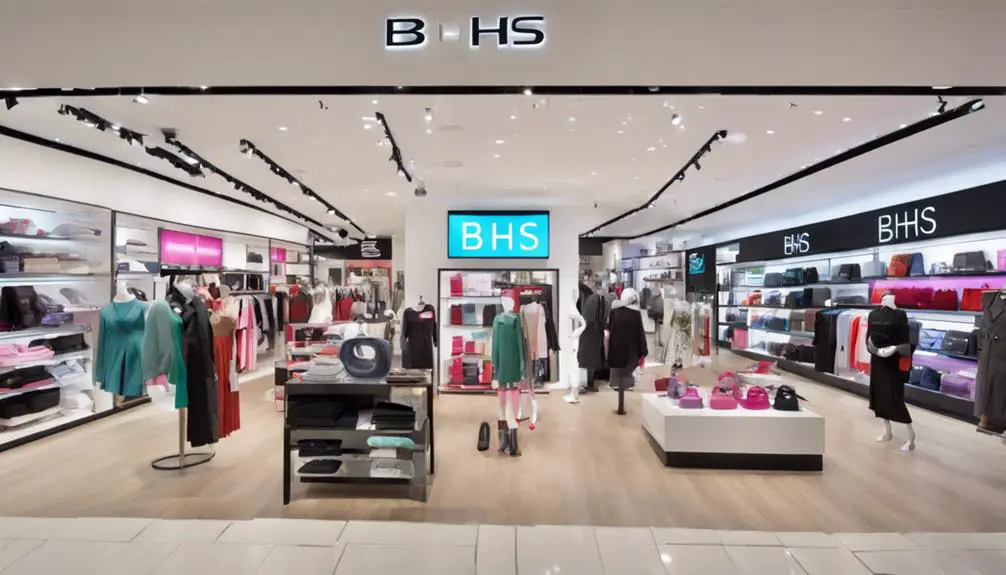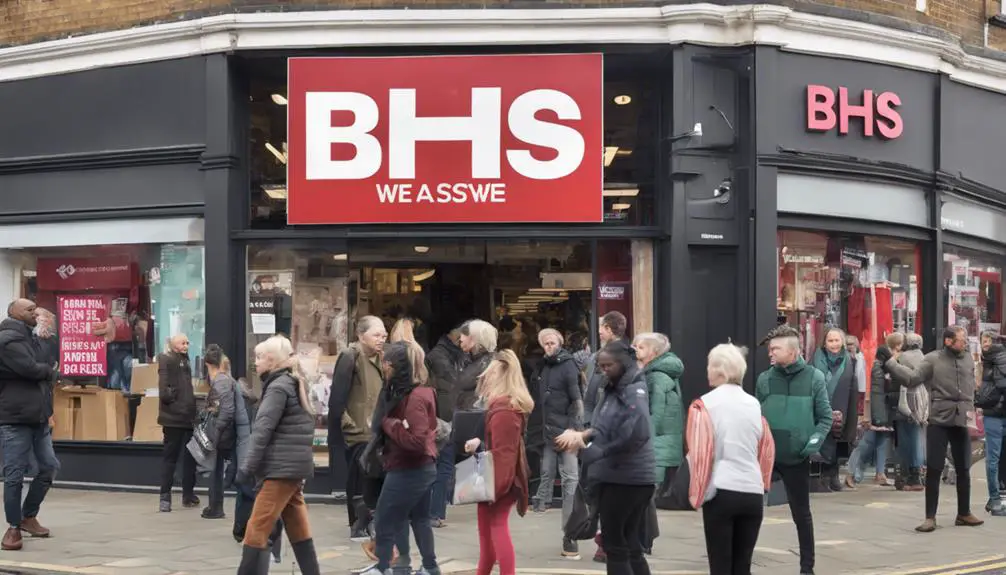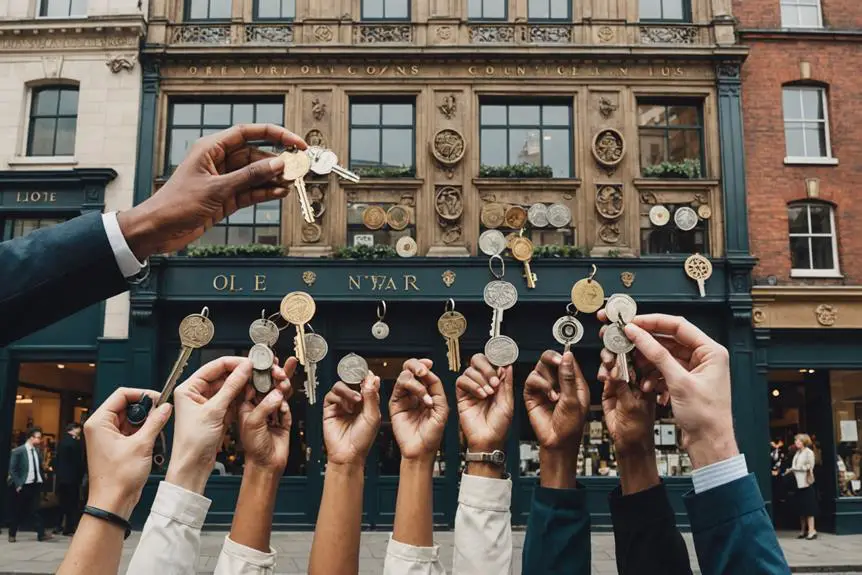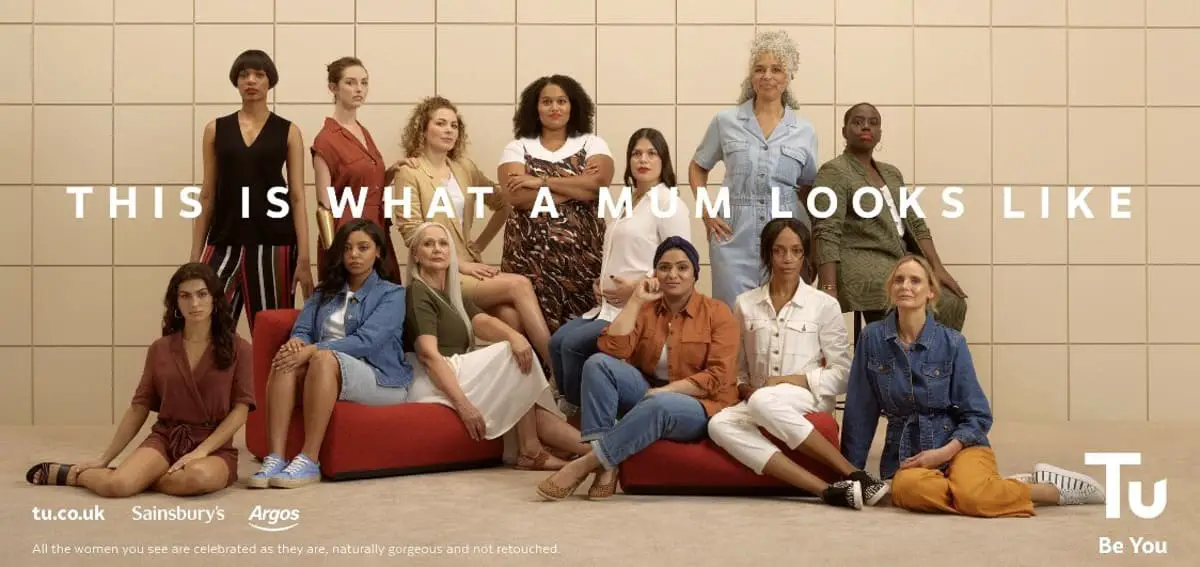So, you're curious about who owns BHS, huh? Well, BHS is currently owned by the Al Mana Group, which is a Qatari conglomerate focused on retail and fashion. They snagged the brand back in June 2016, after it fell into administration. Can you believe they only kept around 84 employees? Crazy, right? They're all about boosting BHS's online presence, too, while keeping the brand's history alive. It's like a retail rescue mission! Want to know more about how this all came to be? Stick around, there's plenty of fascinating stuff to uncover!
Current Ownership Status

BHS is currently owned by the Al Mana Group, a Qatari conglomerate that stepped in to acquire the brand in June 2016 after it faced administration. Can you believe it? This iconic British retailer, known for its niche products, found a new lease on life! Based in London, the Al Mana Group focuses on various sectors, including retail and fashion, making them a fitting match for BHS.
After the acquisition, they retained a workforce of about 84 employees from the pre-administration days. That's right, they kept some of the talent that knows the ins and outs of British Home Stores! To boost its online business, David Anderson was brought in to help steer BHS into the digital age. Who doesn't love shopping from the comfort of their home, right?
Now, BHS operates under the name "British Home Store London 1928," giving a nod to its rich history. With a focus on unique products, they're carving out a niche in the crowded retail market. So, whether you're after homeware or fashion, BHS is back and ready to serve you! Isn't that exciting?
Historical Overview of BHS
When you think of iconic British retailers, British Home Stores (BHS) undeniably comes to mind. Founded in 1928 by U.S. entrepreneurs, BHS began as a retail chain offering affordable goods, with its first store opening in Brixton, London. By 2016, BHS had grown to 163 stores in the UK and 74 international locations, showcasing impressive expansion since going public in 1933.
However, the journey wasn't all smooth sailing. The ownership changes over the years, especially the acquisition by Sir Philip Green in 2000, marked a significant shift as BHS evolved from a public to a private entity. Unfortunately, the company faced severe financial decline, leading to its administration in April 2016. By then, it had amassed debts exceeding £1.3 billion and a pension deficit of £571 million!
Despite a brief online relaunch in 2016 after administration, BHS struggled to regain its footing in the retail market. This historical overview reminds you that even beloved brands can face tough times. So, what do you think happened to BHS, and could it have been saved?
Key Figures in Ownership

Ownership of BHS has seen some dramatic shifts, especially during its later years. It all started back in 2000 when Sir Philip Green bought BHS for a whopping £200 million. He turned it from a public company into a private one, but things took a turn for the worse. By March 2015, BHS was sold for just £1 to Retail Acquisitions, led by Dominic Chappell. Can you believe that?
During Green's ownership, he and his family raked in over £586 million in dividends, even as the store struggled. Talk about a questionable strategy! By April 2016, BHS entered administration, leaving its future hanging by a thread. But wait, there's a twist! In June 2016, the Al Mana Group swooped in, snapping up BHS's assets. They're now focused on revamping the brand and taking it online.
Financial Challenges Faced
Despite its once-prominent status, the financial challenges faced by BHS were staggering and ultimately led to its downfall. Can you imagine running a company with a debt of £1.3 billion? That's what BHS was up against when it entered administration in April 2016. A huge part of that debt included a pension deficit exceeding £571 million. Talk about a financial decline!
In March 2015, BHS was sold for just £1 to Retail Acquisitions. Sounds like a steal, right? But the new owners didn't know about all the hidden debts. Meanwhile, the Green family, who owned BHS before, extracted £586 million in dividends while the company was struggling. That's some serious mismanagement!
After the administration, the former directors were hit with orders to pay at least £18 million for wrongful trading. Ouch! This just shows how their decisions contributed to BHS's financial mess. So, what happened to a once-thriving retail giant? Poor choices and a lack of transparency turned it into a cautionary tale of ownership gone wrong. Isn't it crazy how quickly things can fall apart?
Impact on Communities and Employees

The financial collapse of BHS didn't just affect its balance sheets; it sent shockwaves through communities and left thousands of employees facing uncertainty. With about 11,000 job losses, many folks found themselves scrambling for work, and the local economies took a hit. You can imagine the emotional responses during those final trading days—customers and employees alike were sad to see a beloved department store chain go.
As BHS closed its doors, communities lost retail options that helped keep town centers buzzing with activity. Major flagship locations, like the one on Oxford Street, became empty shells, hurting local shopping areas even more. When people can't shop locally, they turn to online shopping or discount stores, which only adds to the decline.
It's a tough situation for everyone involved. You might wonder, what can be done? Supporting local businesses and advocating for new retail options can help revive those once-thriving communities. Together, we can make sure that the loss of BHS doesn't mean the end of vibrant local economies. So, what are you waiting for? Let's rally and bring back the heart of our high streets!
Frequently Asked Questions
Who Is BHS Owned By?
BHS's history reflects significant controversies and financial struggles. As you explore BHS's brand evolution and retail strategy, consider its market impact, customer loyalty, employee experiences, competitors, and future plans that shape its ongoing journey.
How Much Did Philip Green Buy BHS For?
You'd find that Philip Green's investment in BHS acquisition price was £200 million. This decision impacted the retail market, leading to financial struggles, shifts in consumer perception, and ongoing challenges regarding BHS's legacy and corporate responsibility issues.
Who Owns Arcadia Group?
You should know that the Arcadia Group's ownership structure rests with Tina Green via Taveta Investments. Their legacy impact on the retail industry includes steering through financial challenges and brand management amidst fierce market competition and shifting consumer trends.
Is BHS Private?
Yes, BHS is private. Its ownership history reflects financial struggles, but the brand's value remains. You'll notice its retail strategy focuses on online presence, impacting customer perception and future prospects despite limited international expansion.
Conclusion
So, who owns BHS now? It's a bit of a rollercoaster, right? From its ups and downs, this iconic store has seen a lot of changes over the years. The challenges it faced were tough, but the spirit of the communities and employees really shines through. It's all about resilience and hope! Whether you're a fan of their cozy sweaters or just love shopping there, BHS has a special place in many hearts. What's your favorite BHS memory?



